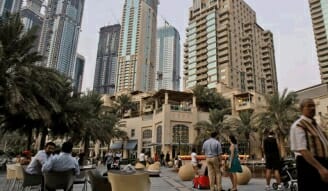
Apr 17, 2015 | Focolare Worldwide
 “In 2014 the company I was working for – Rosette recounts – assigned me to the region of Iraqi Kurdistan (KRI). To facilitate the job placement of my husband, Eric, who also had an excellent CV, we decided to settle in Dubai, in the rich United Arab Emirates where life is pleasant and comfortable. Due to all this wealth many foreigners come to Dubai in pursuit of a better life for themselves and their families, even if this entails leaving one’s own loved ones in their homelands. During one of my trips to Kurdistan, though I was two hours early for my flight, my name was removed from the list of passengers. I was nervous because this meant that I had to take a smaller plane which was scheduled to leave only at one o’clock at night. There was still a lot of time before boarding, but I went to the terminal just the same since we never can tell. Strangely however, there were a lot of people, and many were sleeping on the floor. I asked them how long we had to wait. A woman said: “It depends: we could leave immediately but also within a few days.” In fact, she had been there for two days due to a spelling mistake on her visa. And they would not allow her to leave. Just to start a conversation I asked her if she had something to eat: “Yes, I still have some crackers and a bit of water.” I invited her to have a meal with me and after a lot of insistence, she finally accepted. While we were chatting, her boss called her to check on her and to know if she had enough money to stay there. She had no money. She had sent her entire salary to her son so he could pay his university fees. After the phone call she told me her story: she was separated from her husband, and her two sons lived with their grandparents in her homeland. She had come to Dubai because her daughter was finishing high school and needed money for university. After a while I heard the announcement of my flight. I wondered how long more she would have to wait. I encouraged her take the money I was offering. And I promised I would pray for her family. Her story was just one of the many of how the immigrants live. Some families are in Dubai because of the wars in their countries (Palestinians, Syrians, Iraqis): Dubai is like a safe haven where people can live a normal life. For them, work is everything, the start and the end, since without work they would not have a visa and would not be able to stay in Dubai. Especially for those who are here alone, with the passing of time the physical distance and solitude in a foreign country often obscure their good intentions. We know of people who have extra-marital affairs, destroying in this manner the very family for which they had come here, limiting themselves to just furnishing money to their loved ones. Unfortunately most of these people accept these solutions as unavoidable facts, even if the price to pay is immense. And in the end, also we were asked to pay this same ‘price’. My frequent trips to Dubai led me to spend less and less time with Eric. So we decided to move to Kurdistan, even if this meant renouncing the good job Eric had in Dubai. Initially my company had accepted but during my talks and some violent events in Kurdistan, we were told that the company could not guarantee Eric’s safety and that he, therefore, could not move there. One of my bosses had said: ‘…with time you will get used to being separated …’. In the face of this perspective we immediately decided to resign. We were not going to be separated in any way, even if this meant giving up a well paid job and a career we had studied so much for. I must confess that it was not an easy choice at all. But in our hearts we both knew we were making the right choice. My last working day was 31 December 2014. Last January the Pope came to the Philippines, and in the meeting with families he strongly affirmed the value of the family: “We must be strong in saying “no” to any intent for ideological colonization that can destroy the family.” It seemed as if he was precisely speaking to us, and confirmed the counter current decision we had made.”
“In 2014 the company I was working for – Rosette recounts – assigned me to the region of Iraqi Kurdistan (KRI). To facilitate the job placement of my husband, Eric, who also had an excellent CV, we decided to settle in Dubai, in the rich United Arab Emirates where life is pleasant and comfortable. Due to all this wealth many foreigners come to Dubai in pursuit of a better life for themselves and their families, even if this entails leaving one’s own loved ones in their homelands. During one of my trips to Kurdistan, though I was two hours early for my flight, my name was removed from the list of passengers. I was nervous because this meant that I had to take a smaller plane which was scheduled to leave only at one o’clock at night. There was still a lot of time before boarding, but I went to the terminal just the same since we never can tell. Strangely however, there were a lot of people, and many were sleeping on the floor. I asked them how long we had to wait. A woman said: “It depends: we could leave immediately but also within a few days.” In fact, she had been there for two days due to a spelling mistake on her visa. And they would not allow her to leave. Just to start a conversation I asked her if she had something to eat: “Yes, I still have some crackers and a bit of water.” I invited her to have a meal with me and after a lot of insistence, she finally accepted. While we were chatting, her boss called her to check on her and to know if she had enough money to stay there. She had no money. She had sent her entire salary to her son so he could pay his university fees. After the phone call she told me her story: she was separated from her husband, and her two sons lived with their grandparents in her homeland. She had come to Dubai because her daughter was finishing high school and needed money for university. After a while I heard the announcement of my flight. I wondered how long more she would have to wait. I encouraged her take the money I was offering. And I promised I would pray for her family. Her story was just one of the many of how the immigrants live. Some families are in Dubai because of the wars in their countries (Palestinians, Syrians, Iraqis): Dubai is like a safe haven where people can live a normal life. For them, work is everything, the start and the end, since without work they would not have a visa and would not be able to stay in Dubai. Especially for those who are here alone, with the passing of time the physical distance and solitude in a foreign country often obscure their good intentions. We know of people who have extra-marital affairs, destroying in this manner the very family for which they had come here, limiting themselves to just furnishing money to their loved ones. Unfortunately most of these people accept these solutions as unavoidable facts, even if the price to pay is immense. And in the end, also we were asked to pay this same ‘price’. My frequent trips to Dubai led me to spend less and less time with Eric. So we decided to move to Kurdistan, even if this meant renouncing the good job Eric had in Dubai. Initially my company had accepted but during my talks and some violent events in Kurdistan, we were told that the company could not guarantee Eric’s safety and that he, therefore, could not move there. One of my bosses had said: ‘…with time you will get used to being separated …’. In the face of this perspective we immediately decided to resign. We were not going to be separated in any way, even if this meant giving up a well paid job and a career we had studied so much for. I must confess that it was not an easy choice at all. But in our hearts we both knew we were making the right choice. My last working day was 31 December 2014. Last January the Pope came to the Philippines, and in the meeting with families he strongly affirmed the value of the family: “We must be strong in saying “no” to any intent for ideological colonization that can destroy the family.” It seemed as if he was precisely speaking to us, and confirmed the counter current decision we had made.”
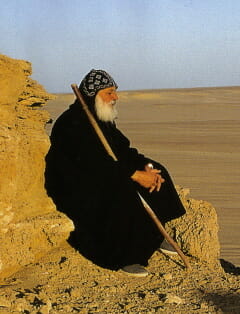
Apr 15, 2015 | Focolare Worldwide
 «Many have tried to explain the roots and reasons behind the start of monastic life, but the sayings and experiences of the Fathers show that the monks are “living martyrs,” and that they “abandoned the world to embrace the sole reality worth living for – God.” It is as if they wanted to respond to God’s love, which is fully described in a verse of the Coptic Mass we call the Divine Liturgy, which addresses God saying: “Of all the words said, there is nothing that can describe Your love for mankind.” St. Jerome says that their asceticism and life as hermits proclaim, “we have been struck by the darts of Divine love,” and each one repeats: “I have found what my soul longs for; I will hold on to it tightly and never leave it.” These monks, therefore, only wishing to give themselves completely to this love and to consecrate themselves to Him, had no choice but to leave the cities.
«Many have tried to explain the roots and reasons behind the start of monastic life, but the sayings and experiences of the Fathers show that the monks are “living martyrs,” and that they “abandoned the world to embrace the sole reality worth living for – God.” It is as if they wanted to respond to God’s love, which is fully described in a verse of the Coptic Mass we call the Divine Liturgy, which addresses God saying: “Of all the words said, there is nothing that can describe Your love for mankind.” St. Jerome says that their asceticism and life as hermits proclaim, “we have been struck by the darts of Divine love,” and each one repeats: “I have found what my soul longs for; I will hold on to it tightly and never leave it.” These monks, therefore, only wishing to give themselves completely to this love and to consecrate themselves to Him, had no choice but to leave the cities.
St. Basil clearly announced: “Whoever loves God leaves all and goes towards Him.” And it is said that St. Tawadros, disciple of St. Pachomius, “had only one interest in the world – to love God with all his heart by following the command of Jesus Christ.” We can sense that the root of ascetic life is to resemble Christ: completely stripping oneself of all things, and following the Father’s will which is virginity, in continual contact with God the Father through prayer. Fr. Matta El Meskin explained it thoroughly: “The warranty of our consecration (as monks) lies in our holding on to Christ personally, and following the Bible’s teachings. In this way, with Christ and the Bible, we will be able to pursue our path in continuous growth, to the very end.”
The choice of the consecrated person is to follow Jesus, the “Way, the Truth and the Life.” This means living for Christ and for him alone and following him in his lifestyle. He chose poverty, virginity and obedience. The monk, therefore, does not choose poverty, but Christ the poor one. The choice is the person of Jesus himself, and so, of what Christ lived, and the how and why he lived in this way. As for the communitarian aspect in the ascetic life of the desert monks, let us recall how – for example in the monasteries that followed after St. Pachomius – the life of communion became the extension of the primitive Church during the time of the apostles. Looking at the life of the Fathers, we can trace some communitarian characteristics: mutual love (St. Pachomius always exhorted his disciples to love one another, and that it was due to the charity among the monks that this life spread and continued up to today), and life together (the dominant feature of these first Christian communities was the “sharing of all they had” in all the aspects of the monks community life).
The teachings of the Desert Fathers remind me about the meditation of Chiara Lubich, “The great attraction of modern times,” which fully expresses what I feel: “To penetrate to the highest contemplation, while mingling with everyone.” It is a contemplation that actualises the life of the Fathers in this century, but in the midst of the world.
T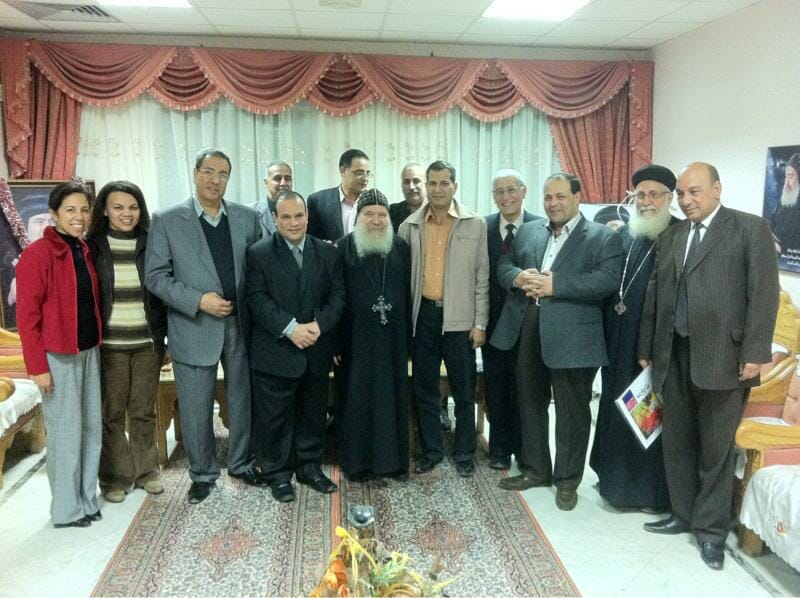 he spiritual presence of Jesus in our midst with the Catholic focolarine with whom I live in the Focolare Centre in Sohag, and the commitment to love each other, have made us like real sisters and caused us to experiment the joy of the Risen Lord, beyond all our differences. In our daily life we share everything we have: we pray, work, rejoice and share the moments of suffering of the people around us. We try to bear witness through our lives, that God is love.
he spiritual presence of Jesus in our midst with the Catholic focolarine with whom I live in the Focolare Centre in Sohag, and the commitment to love each other, have made us like real sisters and caused us to experiment the joy of the Risen Lord, beyond all our differences. In our daily life we share everything we have: we pray, work, rejoice and share the moments of suffering of the people around us. We try to bear witness through our lives, that God is love.
Living for the fullness of unity in Christ’s Church “that all may be one,” fascinates me more and more. I rejoice about the beauty and variety of the gifts of God I find in the various Churches, and the aspiration and emotion of seeing that we are united in Christ in our midst and in the future of the Church in God’s design.
My country also testifies to this with the big and small steps taken along the ecumenical journey. For example, there is now an ecumenical commission which was formed some years ago, with people of every Christian confession existing in Sohag. We meet in a different Church every time: this year it will be in the Coptic Orthodox Church. On 5 March almost all the local heads of the churches were present. The main theme was “the victory over evil,” starting from the persecution of Christians in Libya, which traces the steps of the people of Israel on their departure from Egypt. «The flag that flies above us is that of God’s love,» affirmed the Coptic Orthodox Bishop Bakhoum, who wished that all those present «will always meet in Love.»
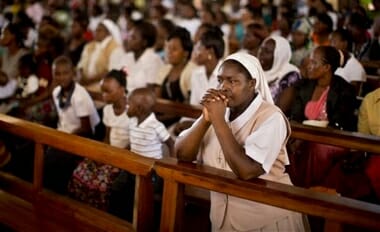
Apr 15, 2015 | Focolare Worldwide, Senza categoria
”The slaughter in Garissa took place on Good Friday. 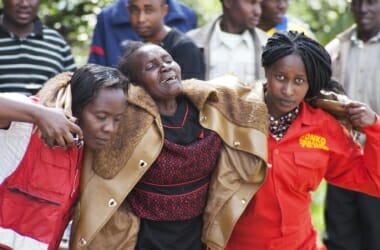 I went to the morgue where they were taking the bodies of the students for identification, not far from my home in Nairobi. I took my camera along. It was impossible not to hear the sirens. I found the parents of the murdered students fainting on one side. . . and on ther other my colleagues with news cameras. I could certainly have shot a few interviews, but I just couldn’t do it; I found myself weeping with the families. There was strong pressure from all sides, opinions from the public who were anxious for news. But I needed time to digest the painful situation in order to be able to say something that would be constructive. I felt my task was to remain quiet with this pain and resist the pressure.”
I went to the morgue where they were taking the bodies of the students for identification, not far from my home in Nairobi. I took my camera along. It was impossible not to hear the sirens. I found the parents of the murdered students fainting on one side. . . and on ther other my colleagues with news cameras. I could certainly have shot a few interviews, but I just couldn’t do it; I found myself weeping with the families. There was strong pressure from all sides, opinions from the public who were anxious for news. But I needed time to digest the painful situation in order to be able to say something that would be constructive. I felt my task was to remain quiet with this pain and resist the pressure.” 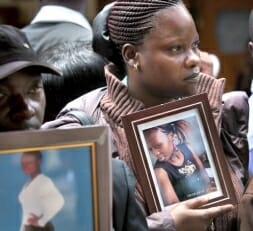 There were over 150 victims of the attack by Somali extremists at the Garissa University College in North East Kenya. The terrorists began their attack on April 3rd, targeting the Christian students. It was only a day-long front attack by government forces that prevented an even worse slaughter. But the general fear of new attacks remains so high that any incident is enough to unleash panic with very serious consequences as happened on April 12th in another university college at Uthiru, near Nairobi. An electrical transfomer caught fire on the fourth and fifth floor, causing an explosion that was similar to that of the bomb. The number of the dead reached 150 with several others seriously wounded. “From the first days of the attack, many of us from our community were in the morgue where 148 bodies of murdered students were taken, in order to console the people who had lost children,” Charles Besigye from the local Focolare community recounts. “Today, on April 11th, we and some of our young people spent the afternoon at the morgue. It was so heartbreaking! People in total suspense who, a week later have not yet found their children. Some bodies have already been identified and they are carrying them back to their villages for burial. The suffering is huge. . . the relatives a desperate sight.We stayed with them to share their suffering, and to help them carry this heavy cross. To weep with those who are still able to, because there are some who have no more tears to shed. One of us offered to help prepare the bodies of the deceased students before their relatives saw them. It was a powerful experience! There’s much solidarity on the part of several associations and the Kenyan people. They bring bread, milk, beverages, and so on. . . The sacred atmosphere that we breathe is overwhelming. There are people who offer comfort, others who pray to God.”
There were over 150 victims of the attack by Somali extremists at the Garissa University College in North East Kenya. The terrorists began their attack on April 3rd, targeting the Christian students. It was only a day-long front attack by government forces that prevented an even worse slaughter. But the general fear of new attacks remains so high that any incident is enough to unleash panic with very serious consequences as happened on April 12th in another university college at Uthiru, near Nairobi. An electrical transfomer caught fire on the fourth and fifth floor, causing an explosion that was similar to that of the bomb. The number of the dead reached 150 with several others seriously wounded. “From the first days of the attack, many of us from our community were in the morgue where 148 bodies of murdered students were taken, in order to console the people who had lost children,” Charles Besigye from the local Focolare community recounts. “Today, on April 11th, we and some of our young people spent the afternoon at the morgue. It was so heartbreaking! People in total suspense who, a week later have not yet found their children. Some bodies have already been identified and they are carrying them back to their villages for burial. The suffering is huge. . . the relatives a desperate sight.We stayed with them to share their suffering, and to help them carry this heavy cross. To weep with those who are still able to, because there are some who have no more tears to shed. One of us offered to help prepare the bodies of the deceased students before their relatives saw them. It was a powerful experience! There’s much solidarity on the part of several associations and the Kenyan people. They bring bread, milk, beverages, and so on. . . The sacred atmosphere that we breathe is overwhelming. There are people who offer comfort, others who pray to God.” During the Way of the Cross at the Roman Colosseum on the evening of Good Friday, the Pope used harsh words: “The thirst of Your Merciful Father,” said Pope Francis, “which in You wished to embrace, forgive and save humanity, makes us think of the thirst of our persecuted brothers and sisters, beheaded and crucified for their faith in You, right beneath our eyes, or often with our complicit silence.” It is a strong warning that urges us not to remain silent.
During the Way of the Cross at the Roman Colosseum on the evening of Good Friday, the Pope used harsh words: “The thirst of Your Merciful Father,” said Pope Francis, “which in You wished to embrace, forgive and save humanity, makes us think of the thirst of our persecuted brothers and sisters, beheaded and crucified for their faith in You, right beneath our eyes, or often with our complicit silence.” It is a strong warning that urges us not to remain silent.
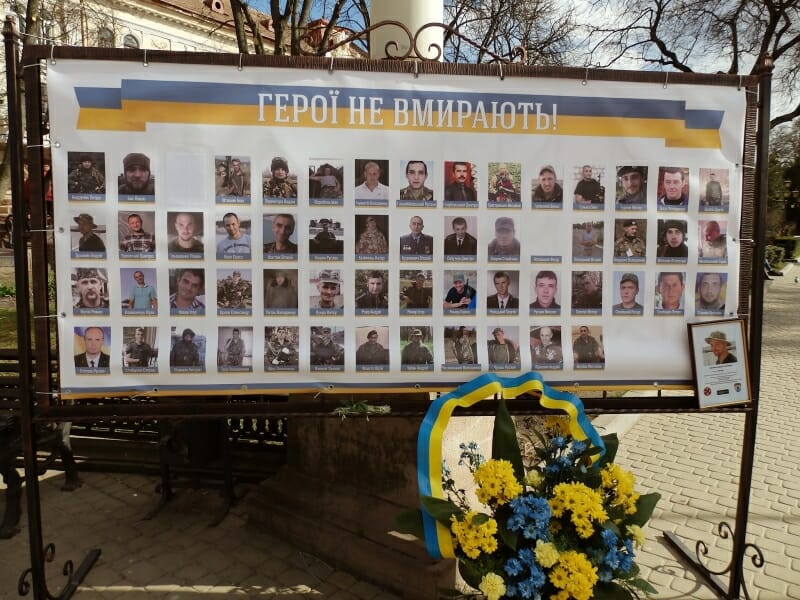
Apr 13, 2015 | Focolare Worldwide
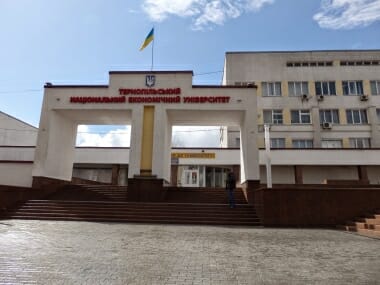 In his heartfelt plea for our many brothers and sisters in the world who “unjustly suffer the consequences of present violence and war,” the Pope also prayed for “the beloved Ukraine” that “it might find peace and hope thanks to the commitment of all interested parties.” Yes, because the war in Ukraine even now continues in its absurdity and violence. We are talking with Roberto Catalano who has been invited to hold conferences on the topic of dialogue, at the Universties of Leopoli, Ivanova Franziksva and Ternopil. It is significant that in the midst of the ‘crisis,’ the young people (and their tutor), rather than becoming entrenched in their private worlds, are out working for deeper dialogue as the only resource that directs their every effort. Roberto, what was the general feeling among the people you met?
In his heartfelt plea for our many brothers and sisters in the world who “unjustly suffer the consequences of present violence and war,” the Pope also prayed for “the beloved Ukraine” that “it might find peace and hope thanks to the commitment of all interested parties.” Yes, because the war in Ukraine even now continues in its absurdity and violence. We are talking with Roberto Catalano who has been invited to hold conferences on the topic of dialogue, at the Universties of Leopoli, Ivanova Franziksva and Ternopil. It is significant that in the midst of the ‘crisis,’ the young people (and their tutor), rather than becoming entrenched in their private worlds, are out working for deeper dialogue as the only resource that directs their every effort. Roberto, what was the general feeling among the people you met? 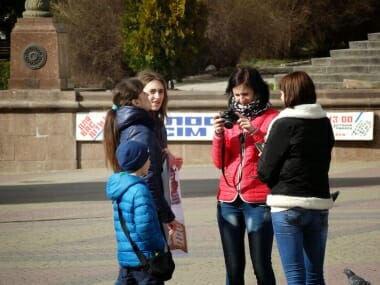 “At the end of one conference, one of my scholastic colleagues showed me three photos of some ex-students of the University who had been killed in the conflict in the south of the country. With eyes filled with tears, he told me that every evening after lessons, a group of students gathers in the cafeteria of the university to cook Ukrainian dishes, which are then frozen and delivered to soldiers. Annother woman told me about her six year-old son who draws cartoons and sends them to soldiers, as a sign of thanks for defending his country. Unfortunately, unlike last year, the news is no longer reporting on what is taking place in Ukraine. Yet, there is actually a war underway in East Ukraine.” There seems to be no way out of the situation that is generating suffering and suspense in the hearts of the people. . . “I had living proof of this deep suffering during every moment of my stay in Ukraine. Students and professors asked me what I thought about the situation in the country and, above all, what the rest of Europe was saying. I didn’t have the nerve to express judgements. Faced with their fear and suffering I preferred to listen and stay silent. I was impressed by the strength and dignity of that people, but it also frightened me that the rest of Europe and of the world have abandoned them to their fate, aggravated also by the growing nationalism, another phenomenon that could be hiding large dangers for the future.”
“At the end of one conference, one of my scholastic colleagues showed me three photos of some ex-students of the University who had been killed in the conflict in the south of the country. With eyes filled with tears, he told me that every evening after lessons, a group of students gathers in the cafeteria of the university to cook Ukrainian dishes, which are then frozen and delivered to soldiers. Annother woman told me about her six year-old son who draws cartoons and sends them to soldiers, as a sign of thanks for defending his country. Unfortunately, unlike last year, the news is no longer reporting on what is taking place in Ukraine. Yet, there is actually a war underway in East Ukraine.” There seems to be no way out of the situation that is generating suffering and suspense in the hearts of the people. . . “I had living proof of this deep suffering during every moment of my stay in Ukraine. Students and professors asked me what I thought about the situation in the country and, above all, what the rest of Europe was saying. I didn’t have the nerve to express judgements. Faced with their fear and suffering I preferred to listen and stay silent. I was impressed by the strength and dignity of that people, but it also frightened me that the rest of Europe and of the world have abandoned them to their fate, aggravated also by the growing nationalism, another phenomenon that could be hiding large dangers for the future.”  Exactly as the Pope said when he talked about the slaughter of the students in Kenya. In the face of these atrocities, it seems like the international community turns its eyes the other way. And yet, the Ukrainian people are also our brothers and sisters, because of our common humanity and our common Christian faith that inspires them. “I visited a large church where the liturgy was being celebrated according to the Eastern Rite. The beautiful and very modern iconostasis was quite striking, but more surprising was the religiosity of the people who were so attentive and wrapt in prayer. I was struck by the long queue of people waiting for Confession. Seventy years of Marxism didn’t wipe out the faith of the people.” In your opinion, is there any hope there will be peace? “I only visited one half of Ukraine and wasn’t able to hear the other side, but they also have their suffering that is perhaps more difficult to understand. And it’s another story over here with its own twists and turns, but also with its present problems that are dictated by international interests in gas and oil. There is the risk of silence that covers up the suffering of millions of people. As the Pope suggested, there is a need for commitment from all the interersted parties. This is the only way an enduring peace will be able to be reached.
Exactly as the Pope said when he talked about the slaughter of the students in Kenya. In the face of these atrocities, it seems like the international community turns its eyes the other way. And yet, the Ukrainian people are also our brothers and sisters, because of our common humanity and our common Christian faith that inspires them. “I visited a large church where the liturgy was being celebrated according to the Eastern Rite. The beautiful and very modern iconostasis was quite striking, but more surprising was the religiosity of the people who were so attentive and wrapt in prayer. I was struck by the long queue of people waiting for Confession. Seventy years of Marxism didn’t wipe out the faith of the people.” In your opinion, is there any hope there will be peace? “I only visited one half of Ukraine and wasn’t able to hear the other side, but they also have their suffering that is perhaps more difficult to understand. And it’s another story over here with its own twists and turns, but also with its present problems that are dictated by international interests in gas and oil. There is the risk of silence that covers up the suffering of millions of people. As the Pope suggested, there is a need for commitment from all the interersted parties. This is the only way an enduring peace will be able to be reached.
![Orthodox Easter]()
Apr 12, 2015 | Focolare Worldwide
 |
Christos anesti! Alithos anesti!
Христос воскресе!Christ is Risen! Indeed He is risen!
Khrishti unjal! Vertet unjal!
Hristos voskrese! Vo istina voskrese!
Khrystos uvaskros! Sapraudy uvaskros!
Le Christ est ressuscité! En verité il est ressuscité!
Kriste ahzdkhah! Chezdmaridet!
Christus ist erstanden! Er ist wahrhaftig erstanden!
Cristo è risorto! Veramente è risorto!
Cristos a inviat! Adevarat a inviat!
Khristos voskrese! Voistinu voskrese!
Cristos vaskres! Vaistinu vaskres!Christ is risen from the dead,
trampling down death by death,
and on those in the tombs bestowing life!Христос воскресе из мертвых,
смертию смерть поправ,
и сущим во гробех живот даровав!
|

 “In 2014 the company I was working for – Rosette recounts – assigned me to the region of Iraqi Kurdistan (KRI). To facilitate the job placement of my husband, Eric, who also had an excellent CV, we decided to settle in Dubai, in the rich United Arab Emirates where life is pleasant and comfortable. Due to all this wealth many foreigners come to Dubai in pursuit of a better life for themselves and their families, even if this entails leaving one’s own loved ones in their homelands. During one of my trips to Kurdistan, though I was two hours early for my flight, my name was removed from the list of passengers. I was nervous because this meant that I had to take a smaller plane which was scheduled to leave only at one o’clock at night. There was still a lot of time before boarding, but I went to the terminal just the same since we never can tell. Strangely however, there were a lot of people, and many were sleeping on the floor. I asked them how long we had to wait. A woman said: “It depends: we could leave immediately but also within a few days.” In fact, she had been there for two days due to a spelling mistake on her visa. And they would not allow her to leave. Just to start a conversation I asked her if she had something to eat: “Yes, I still have some crackers and a bit of water.” I invited her to have a meal with me and after a lot of insistence, she finally accepted. While we were chatting, her boss called her to check on her and to know if she had enough money to stay there. She had no money. She had sent her entire salary to her son so he could pay his university fees. After the phone call she told me her story: she was separated from her husband, and her two sons lived with their grandparents in her homeland. She had come to Dubai because her daughter was finishing high school and needed money for university. After a while I heard the announcement of my flight. I wondered how long more she would have to wait. I encouraged her take the money I was offering. And I promised I would pray for her family. Her story was just one of the many of how the immigrants live. Some families are in Dubai because of the wars in their countries (Palestinians, Syrians, Iraqis): Dubai is like a safe haven where people can live a normal life. For them, work is everything, the start and the end, since without work they would not have a visa and would not be able to stay in Dubai. Especially for those who are here alone, with the passing of time the physical distance and solitude in a foreign country often obscure their good intentions. We know of people who have extra-marital affairs, destroying in this manner the very family for which they had come here, limiting themselves to just furnishing money to their loved ones. Unfortunately most of these people accept these solutions as unavoidable facts, even if the price to pay is immense. And in the end, also we were asked to pay this same ‘price’. My frequent trips to Dubai led me to spend less and less time with Eric. So we decided to move to Kurdistan, even if this meant renouncing the good job Eric had in Dubai. Initially my company had accepted but during my talks and some violent events in Kurdistan, we were told that the company could not guarantee Eric’s safety and that he, therefore, could not move there. One of my bosses had said: ‘…with time you will get used to being separated …’. In the face of this perspective we immediately decided to resign. We were not going to be separated in any way, even if this meant giving up a well paid job and a career we had studied so much for. I must confess that it was not an easy choice at all. But in our hearts we both knew we were making the right choice. My last working day was 31 December 2014. Last January the Pope came to the Philippines, and in the meeting with families he strongly affirmed the value of the family: “We must be strong in saying “no” to any intent for ideological colonization that can destroy the family.” It seemed as if he was precisely speaking to us, and confirmed the counter current decision we had made.”
“In 2014 the company I was working for – Rosette recounts – assigned me to the region of Iraqi Kurdistan (KRI). To facilitate the job placement of my husband, Eric, who also had an excellent CV, we decided to settle in Dubai, in the rich United Arab Emirates where life is pleasant and comfortable. Due to all this wealth many foreigners come to Dubai in pursuit of a better life for themselves and their families, even if this entails leaving one’s own loved ones in their homelands. During one of my trips to Kurdistan, though I was two hours early for my flight, my name was removed from the list of passengers. I was nervous because this meant that I had to take a smaller plane which was scheduled to leave only at one o’clock at night. There was still a lot of time before boarding, but I went to the terminal just the same since we never can tell. Strangely however, there were a lot of people, and many were sleeping on the floor. I asked them how long we had to wait. A woman said: “It depends: we could leave immediately but also within a few days.” In fact, she had been there for two days due to a spelling mistake on her visa. And they would not allow her to leave. Just to start a conversation I asked her if she had something to eat: “Yes, I still have some crackers and a bit of water.” I invited her to have a meal with me and after a lot of insistence, she finally accepted. While we were chatting, her boss called her to check on her and to know if she had enough money to stay there. She had no money. She had sent her entire salary to her son so he could pay his university fees. After the phone call she told me her story: she was separated from her husband, and her two sons lived with their grandparents in her homeland. She had come to Dubai because her daughter was finishing high school and needed money for university. After a while I heard the announcement of my flight. I wondered how long more she would have to wait. I encouraged her take the money I was offering. And I promised I would pray for her family. Her story was just one of the many of how the immigrants live. Some families are in Dubai because of the wars in their countries (Palestinians, Syrians, Iraqis): Dubai is like a safe haven where people can live a normal life. For them, work is everything, the start and the end, since without work they would not have a visa and would not be able to stay in Dubai. Especially for those who are here alone, with the passing of time the physical distance and solitude in a foreign country often obscure their good intentions. We know of people who have extra-marital affairs, destroying in this manner the very family for which they had come here, limiting themselves to just furnishing money to their loved ones. Unfortunately most of these people accept these solutions as unavoidable facts, even if the price to pay is immense. And in the end, also we were asked to pay this same ‘price’. My frequent trips to Dubai led me to spend less and less time with Eric. So we decided to move to Kurdistan, even if this meant renouncing the good job Eric had in Dubai. Initially my company had accepted but during my talks and some violent events in Kurdistan, we were told that the company could not guarantee Eric’s safety and that he, therefore, could not move there. One of my bosses had said: ‘…with time you will get used to being separated …’. In the face of this perspective we immediately decided to resign. We were not going to be separated in any way, even if this meant giving up a well paid job and a career we had studied so much for. I must confess that it was not an easy choice at all. But in our hearts we both knew we were making the right choice. My last working day was 31 December 2014. Last January the Pope came to the Philippines, and in the meeting with families he strongly affirmed the value of the family: “We must be strong in saying “no” to any intent for ideological colonization that can destroy the family.” It seemed as if he was precisely speaking to us, and confirmed the counter current decision we had made.”



 I went to the morgue where they were taking the bodies of the students for identification, not far from my home in Nairobi. I took my camera along. It was impossible not to hear the sirens. I found the parents of the murdered students fainting on one side. . . and on ther other my colleagues with news cameras. I could certainly have shot a few interviews, but I just couldn’t do it; I found myself weeping with the families. There was strong pressure from all sides, opinions from the public who were anxious for news. But I needed time to digest the painful situation in order to be able to say something that would be constructive. I felt my task was to remain quiet with this pain and resist the pressure.”
I went to the morgue where they were taking the bodies of the students for identification, not far from my home in Nairobi. I took my camera along. It was impossible not to hear the sirens. I found the parents of the murdered students fainting on one side. . . and on ther other my colleagues with news cameras. I could certainly have shot a few interviews, but I just couldn’t do it; I found myself weeping with the families. There was strong pressure from all sides, opinions from the public who were anxious for news. But I needed time to digest the painful situation in order to be able to say something that would be constructive. I felt my task was to remain quiet with this pain and resist the pressure.” 


 “At the end of one conference, one of my scholastic colleagues showed me three photos of some ex-students of the University who had been killed in the conflict in the south of the country. With eyes filled with tears, he told me that every evening after lessons, a group of students gathers in the cafeteria of the university to cook Ukrainian dishes, which are then frozen and delivered to soldiers. Annother woman told me about her six year-old son who draws cartoons and sends them to soldiers, as a sign of thanks for defending his country. Unfortunately, unlike last year, the news is no longer reporting on what is taking place in Ukraine. Yet, there is actually a war underway in East Ukraine.” There seems to be no way out of the situation that is generating suffering and suspense in the hearts of the people. . . “I had living proof of this deep suffering during every moment of my stay in Ukraine. Students and professors asked me what I thought about the situation in the country and, above all, what the rest of Europe was saying. I didn’t have the nerve to express judgements. Faced with their fear and suffering I preferred to listen and stay silent. I was impressed by the strength and dignity of that people, but it also frightened me that the rest of Europe and of the world have abandoned them to their fate, aggravated also by the growing nationalism, another phenomenon that could be hiding large dangers for the future.”
“At the end of one conference, one of my scholastic colleagues showed me three photos of some ex-students of the University who had been killed in the conflict in the south of the country. With eyes filled with tears, he told me that every evening after lessons, a group of students gathers in the cafeteria of the university to cook Ukrainian dishes, which are then frozen and delivered to soldiers. Annother woman told me about her six year-old son who draws cartoons and sends them to soldiers, as a sign of thanks for defending his country. Unfortunately, unlike last year, the news is no longer reporting on what is taking place in Ukraine. Yet, there is actually a war underway in East Ukraine.” There seems to be no way out of the situation that is generating suffering and suspense in the hearts of the people. . . “I had living proof of this deep suffering during every moment of my stay in Ukraine. Students and professors asked me what I thought about the situation in the country and, above all, what the rest of Europe was saying. I didn’t have the nerve to express judgements. Faced with their fear and suffering I preferred to listen and stay silent. I was impressed by the strength and dignity of that people, but it also frightened me that the rest of Europe and of the world have abandoned them to their fate, aggravated also by the growing nationalism, another phenomenon that could be hiding large dangers for the future.” 